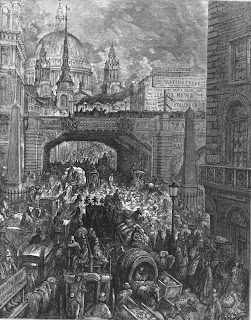The Viceroy of Ouidah - Bruce Chatwin
I found this a little irritating. Brief but over-plotted and over-written, I found the tale of colonial West Africa far inferior to Werner Herzog's loosely adapted movie.
My musings on what I've read since January 2006.
I found this a little irritating. Brief but over-plotted and over-written, I found the tale of colonial West Africa far inferior to Werner Herzog's loosely adapted movie.
A writer looks back on an experience in early adolescence, during a spell at an English country house. The young woman who lives there is conducting an affair with a lower class local man, and the adolescent's naive misunderstanding of the situation results in a catastrophic intervention that begets irreversible and tragic consequences for all three individuals. So, Ian McEwan, now I know where the plot for Atonement came from.
More gently entertaining comic fantasy from the Bone series. The end of this, the third part, involves some major plot revelations that set up the series as something rather more conventional than the earlier episodes would have suggested. Will it descend into cliche or will Smith keep things interesting?
I didn't enjoy my previous attempt at Flanagan, so I was pleased that I allowed my preconceptions to be overcome here. Whereas The Unknown Terrorist was hectoring and literal, Gould's Book of Fish is oblique, bizarre and compelling, if often also fatiguing. The mode is a kind of grubby magical realism, Garccia Marquez trapped in a colonial Tasmanian sewer, with a little of Peter Ackroyd's shifts in time and identity thrown in. At times it is thrilling, at other times baffling, and the postscript throws everything else into a new relief.
This portrait of London in the late 1860s really captures the flavour of the capital at its riotous peak. Portrait is the right word, too, as it is Dore's masterful illustrations that conjure up the extremes of poverty and wealth as well as the sheer industriousness of the place. Jerrold's rather syrupy prose is less exciting, but the depiction of the Oxford and Cambridge Boat Race as an event enjoyed by Londoners of every class was something of an eye-opener.

This is a kind of Pilgrim's Progress for Buddhists. In a simply told tale, an emblematic figure journeys through various spiritual states befoer achieving final glory. I know very little about eastern religion beyond the fact that it's as big a pile of cods as the western variety, so it was interesting in that sense and at least I've read another Nobel Prize winner.
I was in Hong Kong just before the 1996 Handover, but I spent most of my time carousing with other poms passing through, so I was interested in this depiction of a very different gwailo community; the leftovers of Empire that have been there for 50 years. The depiction of the weird culture is convincing, but the book shifts into an unconvincing sub-Greene thriller plot halfway through and loses both credibility and interest.
Whilst reading this I had several people say something along the lines of "You've never read The Blind Assassin? I thought everyone had." It has the rare distinction of appearing regularly in both critic's favourite lists and popularity polls, so I guess I was a little behind.
This devastating memoir of survival in Auschwitz is nigh on unreviewable. What can I say that could equate to the story told herein? The tone is bleak, honest and incredibly lacking in rage, although a quiet anger does sometimes show through. This would be the perfect introduction to this horrific period for teenage readers, and the most eloquent possible response to those insidious antisemites who deny the Holocaust.